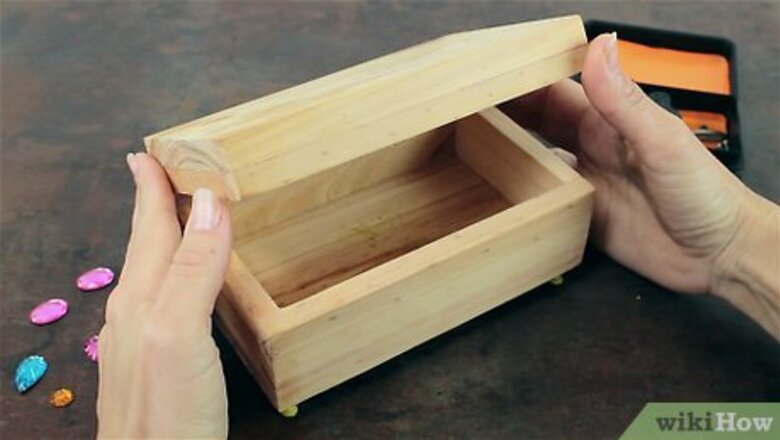
views
Preparing the Box
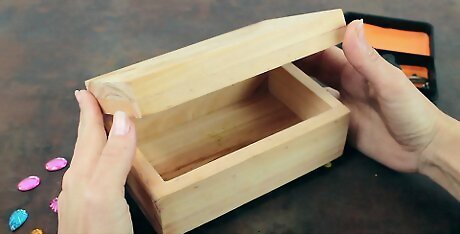
Choose a hinged wooden box to hold the music box mechanism. For most standard sized mechanisms, you'll need a box that is at least 2 in (5.1 cm) deep, 3 in (7.6 cm) long, and 2 in (5.1 cm) wide. Take measurements on your music box mechanism before you choose a box to be sure. Also, keep in mind that larger boxes may work better since they can hold more than just the mechanism. You can also make your own hinged wooden box if you prefer to start from scratch.. Hinged wooden boxes are available at craft supply stores and online in a wide range of sizes and styles.

Paint the inside and outside of the box if desired. Paint both the inside and outside of the box using a sponge brush and acrylic paint in any color. Apply 2-3 coats of the paint to achieve an even look. Then, allow the paint to dry completely before continuing. Painting the wood is only necessary if the box isn't already finished and decorated. If you choose to recycle a box and you already like the way it looks, you don't need to paint over it. You can technically use any type of paint that is approved for use with wood (or whichever material your box is made of). For wooden boxes, you can even use wood stain.
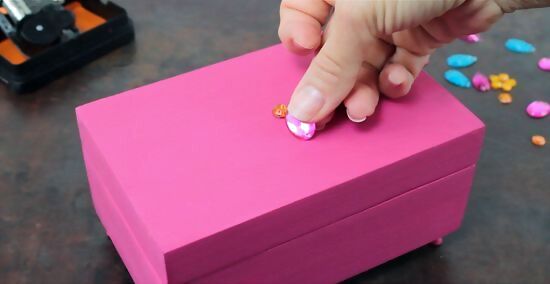
Decorate the lid, if desired. You can leave the outside lid plain or embellish it. Since the musical mechanism won't touch the lid of the box, such decorations should not interfere with how well it works. Some suggestions for how to decorate the lid of your music box include: Using stencils to paint a pretty design onto the lid. Using spray adhesive and Mod Podge to attach a laser-printed photograph to the lid. Gluing a flat-backed cameo or cabochon to the center of the lid for something simple and classy.
Installing the Mechanism
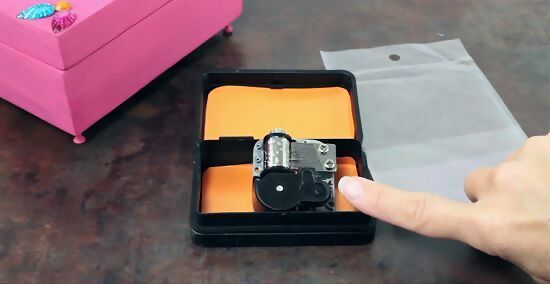
Purchase a music box mechanism kit. There are many types of music box mechanisms available, from ones that operate with gears to those that feature a series of bells or paper scroll mechanisms. Find a music box store or website to choose your preferred type. You can even customize the song by choosing a pre-loaded song or programming the music box with your own song. Make sure that you check the dimensions of the music box mechanism before you purchase it to ensure that it will fit into the box you have chosen.
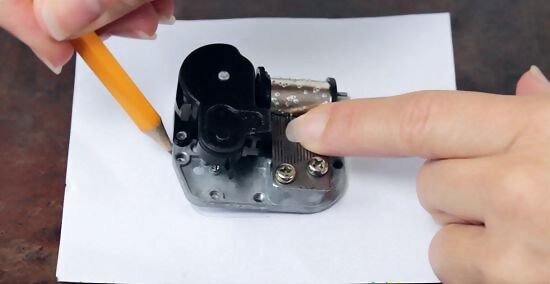
Create a paper template by tracing around the mechanism. Place the musical mechanism onto a sheet of paper and trace around its perimeter with a pen or pencil. Then, use scissors to cut around this outline. Once you cut out the template, flip over the mechanism to reveal the bottom and rest the template on top. Use a pen or pencil to lightly mark the screw holes and keyhole on the paper template. If you cannot see the holes through the paper template, use a small ruler to measure where they lie on the mechanism in comparison to each side. Mark dots on the template using those same measurements.Warning: Some mechanisms do not have screw holes. In this instance, the key will usually be enough to hold the mechanism in place. Do not attempt to create holes for screws in the mechanism since doing so could prevent the movement from working.
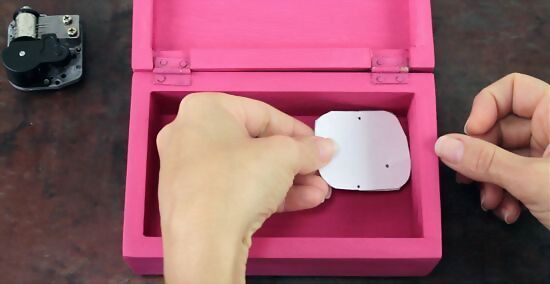
Position the template inside the box off to one side. Place the paper template inside the box, positioning it where you want the mechanism to sit. Use clear tape to hold the template down in its final position. Choose an area along the base of the box, rather than using the sides or lid. Make sure to position the mechanism off to one side of the box or in one of the back corners. However, if you use a small box just big enough to fit the mechanism, center the mechanism inside its base. When determining the best placement for the mechanism, make sure that the screw holes and keyhole will be clear of the feet on the bottom of the music box.
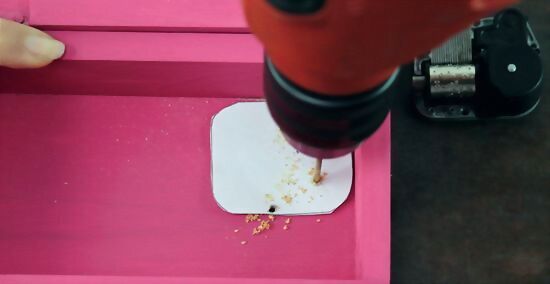
Drill three holes through the box to attach the mechanism. Use a hand drill to create holes in a wooden box. Carefully drill two ⁄8 in (3.2 mm) screw holes and one ⁄4 in (6.4 mm) keyhole through the paper template and through the bottom of the box. Follow the markings you made on the template to ensure correct placement. If you opted for a paper mache box or recycled tin, create the holes using an awl, rubber block, and hammer. Remove the paper template and clear away any shavings or other debris before continuing. Small particles of debris can easily work their way into the inner workings of the musical mechanism, and if that happens, the mechanism may stop playing. Make sure to check your music box mechanism’s instructions to determine what size screws to use.
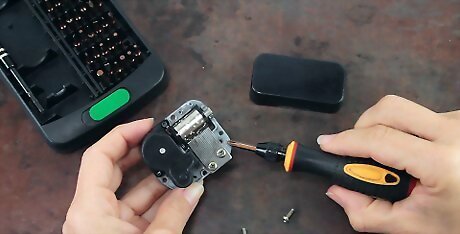
Remove the mechanism case if you want it to be visible. Use a small screwdriver to remove the screws holding the plastic casing onto the mechanism, then snap away the casing itself. You can technically keep the casing over the mechanism, if desired, but removing it will allow you to view the movement as it plays and may create a more aesthetically pleasing result.
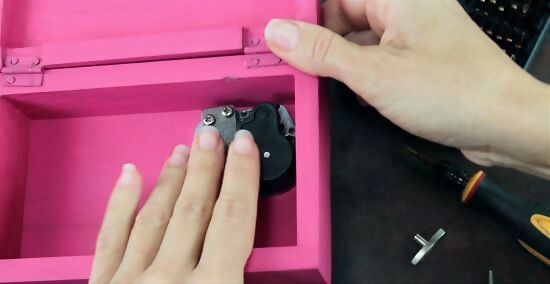
Place the mechanism inside the box. Position the musical mechanism inside the box, directly where the template was. Then, carefully turn the box over while holding the mechanism in place with one hand. Make sure that the screw holes in the box match the screw holes in the mechanism. Also, make sure that the keyhole in the box matches the keyhole of the mechanism.
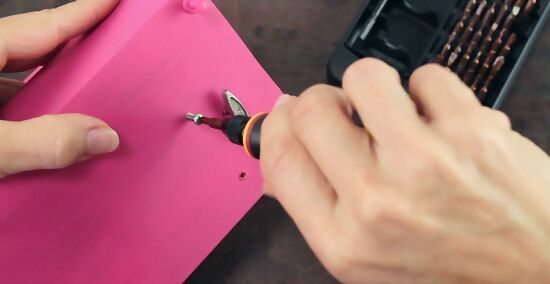
Secure the mechanism with 2 screws through the bottom of the box. Place a ⁄8 in (3.2 mm) screw through each screw hole, then secure both screws in place. They should go through the bottom of the box and into the screw holes of the mechanism. After you fix these screws in place, ensure that the mechanism is secure at the base of the box without being held in place. Remember to check the music box mechanism’s instructions to determine what screw size to use.
Adding the Finishing Touches
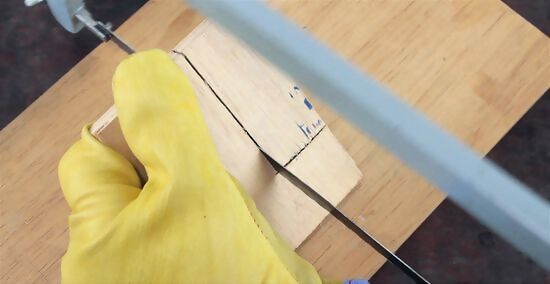
Cut a divider to separate trinkets from the mechanism. Trim a thin piece of wood, making it as long as the width of the box and roughly ⁄8 in (3.2 mm) thick. Ensure that the wood’s width matches or exceeds the height of the mechanism, but is at least ⁄8 to ⁄4 in (3.2 to 6.4 mm) shorter than the side of the box. Then, sand down any rough edges. Tip: You do not need a divider if the box is only large enough for the mechanism and nothing else.
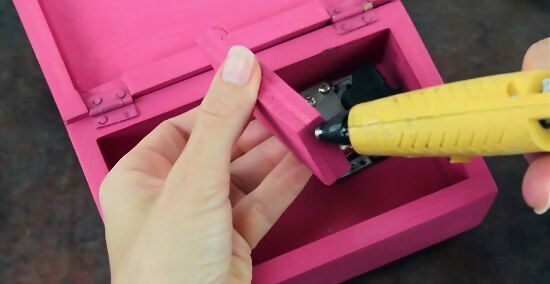
Secure the divider with hot glue or wood glue. Use hot glue or wood glue to adhere the divider to the back and front sides of the box. Position the divider so that it lies just next to the mechanism. Ensure that the divider is not actually touching the moving parts of the mechanism. Let the glue dry completely before continuing. Hot glue will dry within about 5 minutes while wood glue will need to sit for at least 8 hours.
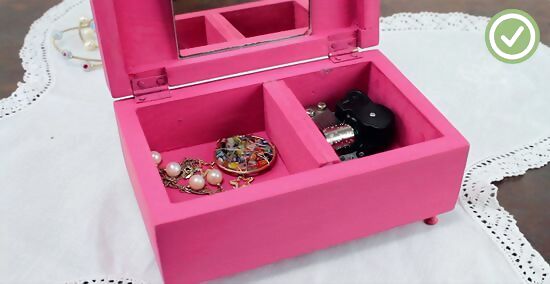
Wind the music box up and let it play. Your music box is finished and ready to use at this point! Add jewelry and other trinkets to the compartment if desired. To enjoy the music, simply wind the key and let it play.

















Comments
0 comment